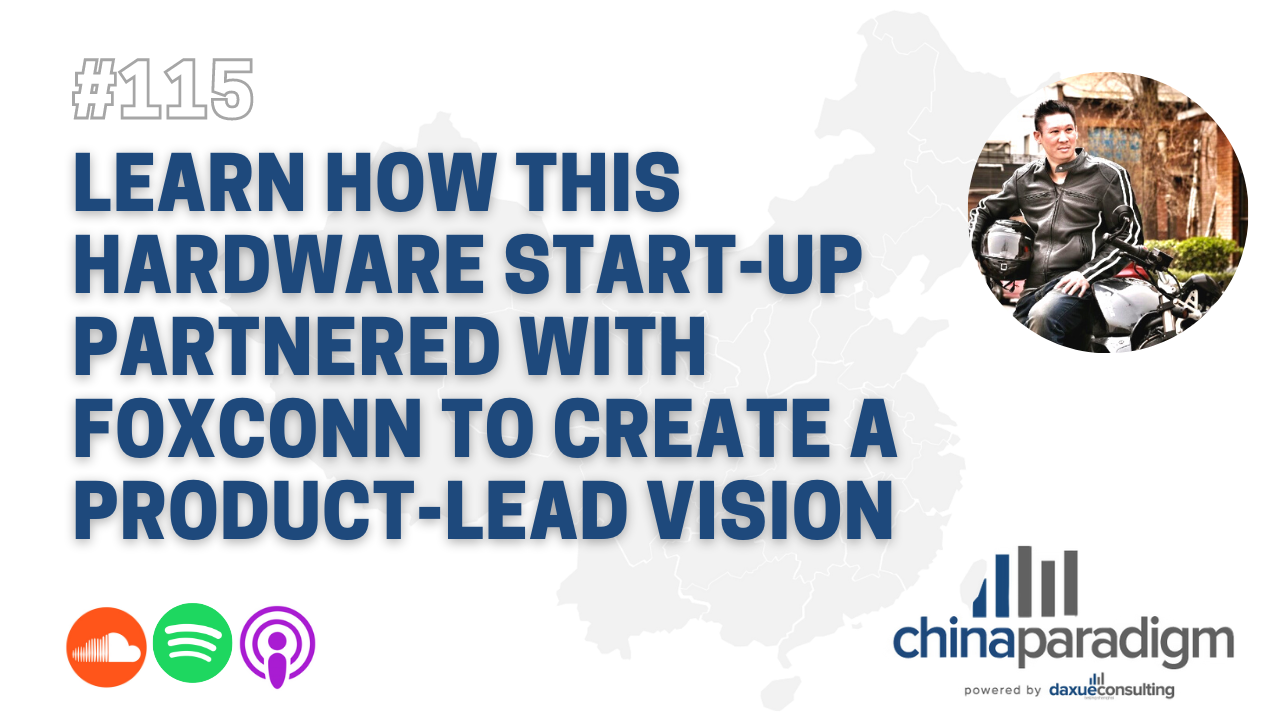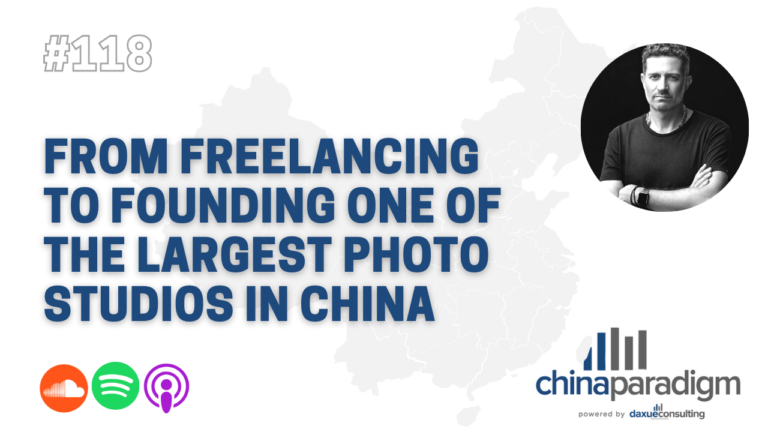Nathan Siy has created a motorbike company in China. Prior to building a motorbike company in China, he did electric motorbike tours in Beijing. In 2014 he founded his company, Evoke Motorcycles, he designs and manufactures electric motorbikes in China. He aims to become the market leader in electric motorbikes in China.
Listen to the full China Paradigm episode 115 on Youtube, Apple Podcast, Spotify, Soundcloud, or Ximalaya.
What is the current position of Evoke Motorcycles in the Chinese market?
Nathan Siy: The market for high-quality electric motorbikes in China is definitely in its infancy. To date, there are subsidies available for electric cars in but there are no subsidies for electric motorbikes in China. Despite there being between 20 and 30 million low-end, electric scooters or non-electric motorbikes being sold in China every year, we still have to educate the consumers about our product. We see a good opportunity because the Chinese government is currently trying to step up their safety standards when it comes to 2 wheeled vehicles and because our motorbikes are built to a very high safety standard, we think the next 5 – 10 years could represent a great chance for us to grow.
What is the pricing policy of Evoke Motorcycles?
Nathan Siy: Roughly 8,000 – 10,000 USD. In Europe and North America, there are a lot of subsidies available for electric motorbikes in those countries but none for electric motorbikes in China so we have had to be a viable business case right from the start. If the subsidies come in, that will be great for our margin. But right now we are mostly selling in Europe and North America so
What was the initial investment for Evoke Motorcycles?
Nathan Siy: In 2 rounds of investment we secured around 1 million USD but over the last 2 years we have brought in around 1.5 million USD in revenue. Because our investment has not been so big we have had to become creative with how we work with factories. We have had to turn our supply chain into our investors, so making them believe in the future in the future of our business. It’s really great when you get these people on board because they can be really helpful even though we are very low quantity production.
Guanxi – how important is it to build trust before establishing a business relationship in China?
Nathan Siy: Very important, but there some misconceptions around guanxi. Guanxi can be built, it’s about trust rather than bribes. But when you want these people to go out of their way to help you, you have to develop and nurture those relationships and that of course involves visiting them and drinking with them but it does not involves plying them with red packets.
How was Evoke Motorcycles able to make working with Foxconn possible?
Nathan Siy: Pure luck, in 2017 Foxconn was looking into e-vehicles and one division was looking into electric 2 wheel vehicles. They found us online, cold-called us, literally came to our door with a business card, and at first, I thought it was a scam, but after 2 months I agreed to meet with them, and since then we have learned so much from them about manufacturing and quality assurance.
At what stage was Evoke Motorcycles before partnering with Foxconn?
Nathan Siy: Well we were doing around 100 – 200 units a year. Maybe 30 electric motorbike batches a year
How did Foxconn impact Evoke Motorcycles’ business strategy?
Nathan Siy: Massively, they helped us out so much in terms of getting things ready for larger quantities. They took our SOP from a 20 or 25-page manual to about a 250 page SOP manual. So in 2017 and 2018 we were bumping up our production procedures really quickly and getting ready for them to take over complete contract manufacturing. And you would think they would take a big part of our equity for this but as a feature of their top-down management system, their goal in 2017 was the electrification of 2 wheeled vehicles, but in 2018, they pivoted to Industry 4.0. They didn’t take any equity in our company and actually, our R&D facility is still over there, so we do some joint projects in battery development.
Riding the Industry 4.0 wave – how Foxconn is able to pivot so fast?
Nathan Siy: They are so dynamic and nimble. At an annual meeting in 2017, the chairman said they needed to look at electrification, each of the 14 or 15 different sub-structures at Foxconn looks at different investment and collaboration opportunities every year but all surrounding one common theme. Their aim is to incubate projects and then take over the manufacturing of those products when they are ready. It’s a very smart business model, but they’re so nimble it’s almost like a gigantic start-up.
What does the process of building electric motorbikes in China look like?
Nathan Siy: We have about 252 components and we have about 30 to 40 suppliers for those components for our electric motorbikes in China. There’s a lot of networking to be done but it’s very hard to have the money to get the production of all the components in-house. But we try to keep the core components in-house, like our battery pack assembly and electronics.
How did Nathan Siy get into building electric motorcycles in China?
Nathan Siy: I started as an electronic engineer. But my hobby has always been motorcycles, all of our team are generally motorcycle enthusiasts. During interviews, we try to get the candidates on our motorbikes. I started my career in the automotive 4 wheel industry and then I took what I knew about cars and applied it to motorbikes. I had the chance to come to Beijing and I found that there was a gap in the market.
Does Evoke Motorcycles have a software development team?
Nathan Siy: Yes, with electric motorbikes now they are heavily electronic controlled so that the electronic side is now slightly more important. You need to have the electronic control side tied down rather than the motorcycling part. We send our software updates to our consumers through our distribution network and they can upgrade their motorbike’s software manually.
Who are Evoke Motorcycles’ clients?
Nathan Siy: We sell through a traditional distribution business model, we sell in about 20 different countries. So we are b2b, we sell to distributors and they sell to dealerships or the end-users directly. Our only interaction with the end-users is when we see them post content on social media using Evoke hashtags. But our relationships with our distributors are very close, we have to make sure they understand the technical aspects of our motorbikes. About 60 – 70 % of our total sales are outside China.
How hard was it for Evoke Motorcycles to obtain proper certification to be able to sell their electric motorbikes in China’s market?
Nathan Siy: Pre 2019 and pre-new government regulations, our electric motorbikes in China were classed in the same category as electric scooters, so for both the average electric scooter you see in China which has a top speed of maybe 40 or 50 km per hour, and our electric motorbikes in China which have a top speed of 150 km per hour, you didn’t need a license and you didn’t need to wear a helmet. Because they were all classified as electric bicycles. Now the classification is clearer and they are defining new standards.
On the engineering side, most of our team has international experience so that meeting and actually exceeding international foreign safety standards has been something we have done since day 1. But for people who want to export the average electric scooters, you see Shanghai to Europe or America, if you don’t control the supply chain you don’t control the adherence to standards. So that’s a big difficulty with exporting electric scooters from China to Europe. Another difficulty for exporting electric scooters from China to Europe is that those scooters have a top speed of 40 km per hour and most of the rest of the world doesn’t have specific bicycle lanes as China does. So you have to ride that 40 km per hour electric scooter in the car lane in the car lane which is obviously quite dangerous. So we designed our electric motorbikes in China to have the power to be able to drive in the car lane.
Is Evoke Motorcycles’ development process a client-focused or a product-focused one?
Nathan Siy: We design our products with ourselves in mind as the main consumer, we are quite representative of the end-user. What we love in our product resonates with our end-users.
How does Nathan Siy see sustainability evolving in China?
Nathan Siy: Sustainability is not a driver for the consumption of our electric motorbikes in China. Because there no subsidies available yet. It’s a secondary thought in China because motorcycling in China is a relatively new concept so we push the fun factor of motorcycling in China in our marketing and the sustainability factor is a by-product. Whereas in Europe the sustainability factor is probably the deciding factor when it comes to purchasing our motorbikes.
Why is Tesla not building electric motorcycles?
Nathan Siy: I read Elon Musk got into a motorbike accident in his youth so he is maybe a little hesitant to get on one these days
What books have inspired Nathan Siy in his entrepreneurial journey?
Nathan Siy: Actually I don’t read a lot, I like to spend my time tinkering with code or with mechanical stuff.
My team inspires me the most. We have amazing ideas and brilliant brainstorming sessions just having conversations about our bikes. They’re not actual meetings, just discussing the motorbikes and then the ideas come out of that.
What productivity tools does Nathan Siy use to manage his company?
Nathan Siy: We use Teambition.
Should he have extra time what other business would Nathan Siy like to pursue?
Nathan Siy: I would like to focus more on the subcomponents of motorbikes. And maybe start producing them.
What unexpected success and failure has Nathan Siy witnessed in China?
Nathan Siy: A success would be the Foxconn thing, where such a huge company would be interested in collaborating with start-ups. Also, the speed of development here is so fast, and there is so much creativity and such a strong work ethic here, too.
Listen to the full China Paradigm episode 115 on Youtube, Apple Podcast, Spotify, Soundcloud, or Ximalaya.





